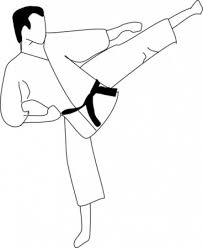记忆方法
将“kick”与“踢”的动作联系起来,想象自己的脚用力“踢”出去,这个动作在视觉和动作记忆上都很清晰,有助于记忆单词的含义。
以上内容由AI生成, 仅供参考和借鉴
中文词源
kick 踢
词源不详,可能来自拟声词,踢东西的声音。
英语词源
- kick
-
kick: [14] Kick is one of the mystery words of English. It first appears towards the end of the 14th century, but no one knows where it came from, and it has no relatives in the other Indo- European languages. It may have been a Scandinavian borrowing.
- kick (v.)
- late 14c., "to strike out with the foot" (earliest in biblical phrase now usually rendered as kick against the pricks), of uncertain origin, perhaps from Old Norse kikna "bend backwards, sink at the knees." "The doubts OED has about the Scandinavian origin of kick are probably unfounded" [Liberman]. Related: Kicked; kicking.
Figurative sense of "complain, protest, rebel against" (late 14c.) probably is from the Bible verse. Slang sense of "die" is attested from 1725 (kick the wind was slang for "be hanged," 1590s; see also bucket). Meaning "to end one's drug habit" is from 1936. Kick in "contribute" is from 1908; kick out "expel" is from 1690s. To kick oneself in self-reproach is from 1891. The children's game of kick the can is attested from 1891. - kick (n.)
- 1520s, from kick (v.). Meaning "recoil (of a gun) when fired" is from 1826. Meaning "surge or fit of pleasure" (often as kicks) is from 1941; originally literally, "stimulation from liquor or drugs" (1844). The kick "the fashion" is c. 1700.
权威例句
- 1. Dave pulled a back muscle and could barely kick the ball.
- 戴夫背部拉伤,几乎没法踢球。
- 2. I went to kick the ball and I completely missed it.
- 我去踢球却踢了个空。
- 3. In the end I just couldn't kick Jimmy when he was down.
- 最后我就是无法做到在吉米倒霉时落井下石。
- 4. He lifted the bike off its stand and kick-started it.
- 他将摩托车撑脚架往上一提,开始蹬车启动。
- 5. I got a kick out of seeing my name in print.
- 当看到我的名字印成铅字时,我感到无比兴奋。

